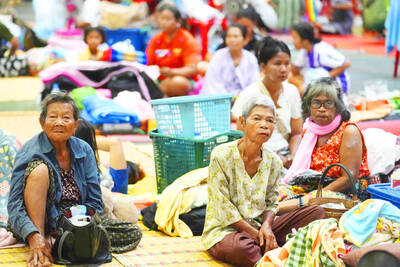Police have found 381 corpses piled up in a private crematorium in northern Mexico’s Ciudad Juarez, the local prosecutor’s office said on Sunday, attributing the grisly find to negligence.
“Preliminarily, we have 381 bodies that were deposited irregularly in the crematorium, which were not cremated,” said Eloy Garcia, communications coordinator of the Chihuahua state prosecutor’s office.
Garcia said the corpses were “stacked” in no apparent order in various rooms of the building where the crematorium operates. They were “just thrown like that, indiscriminately, one on top of the other, on the floor,” he said.

Photo: AP
All the bodies had been embalmed.
Instead of ashes, relatives were given “other material,” Garcia said.
Authorities estimated that some of the remains could have been there for up to two years.
Garcia blamed the “carelessness and irresponsibility” of the crematorium owners.
Such businesses “know what their daily cremation capacity is,” he added.
“You can’t take in more than you can process,” he said. One of the administrators of the crematorium had already turned himself in to prosecutors.
Authorities did not specify whether the corpses belonged to victims of criminal violence.
Mexico, a country hard hit by organized crime, has for years been experiencing a crisis in its forensic system, saturated by the high number of bodies to be processed, the lack of personnel and budgetary restrictions.

FOREST SITE: A rescue helicopter spotted the burning fuselage of the plane in a forested area, with rescue personnel saying they saw no evidence of survivors A passenger plane carrying nearly 50 people crashed yesterday in a remote spot in Russia’s far eastern region of Amur, with no immediate signs of survivors, authorities said. The aircraft, a twin-propeller Antonov-24 operated by Angara Airlines, was headed to the town of Tynda from the city of Blagoveshchensk when it disappeared from radar at about 1pm. A rescue helicopter later spotted the burning fuselage of the plane on a forested mountain slope about 16km from Tynda. Videos published by Russian investigators showed what appeared to be columns of smoke billowing from the wreckage of the plane in a dense, forested area. Rescuers in

Philippine President Ferdinand Marcos Jr is to meet US President Donald Trump this week, hoping Manila’s status as a key Asian ally would secure a more favorable trade deal before the deadline on Friday next week. Marcos would be the first Southeast Asian leader to meet Trump in his second term. Trump has already struck trade deals with two of Manila’s regional partners, Vietnam and Indonesia, driving tough bargains in trade talks even with close allies that Washington needs to keep onside in its strategic rivalry with China. “I expect our discussions to focus on security and defense, of course, but also

POINTING FINGERS: The two countries have accused each other of firing first, with Bangkok accusing Phnom Penh of targeting civilian infrastructure, including a hospital Thai acting Prime Minister Phumtham Wechayachai yesterday warned that cross-border clashes with Cambodia that have uprooted more than 130,000 people “could develop into war,” as the countries traded deadly strikes for a second day. A long-running border dispute erupted into intense fighting with jets, artillery, tanks and ground troops on Thursday, and the UN Security Council was set to hold an emergency meeting on the crisis yesterday. A steady thump of artillery strikes could be heard from the Cambodian side of the border, where the province of Oddar Meanchey reported that one civilian — a 70-year-old man — had been killed and

‘OPPORTUNITY TO ENGAGE’: Antonio Costa and Ursula von der Leyen are to meet Chinese President Xi Jinping to discuss EU-China relations and geopolitical challenges Top leaders from China and the EU are to hold a summit in Beijing this week, as the major economic powers seek to smooth over disputes ranging from trade to the Ukraine conflict. Beijing and Brussels have been gearing up to mark the 50th anniversary of the establishment of diplomatic ties, but a suite of squabbles over state subsidies, market access and wartime sanctions have dampened the festivities. A spokesperson for the Chinese Ministry of Foreign Affairs yesterday confirmed that European Council President Antonio Costa and European Commission President Ursula von der Leyen would visit on Thursday. The statement came after the EU